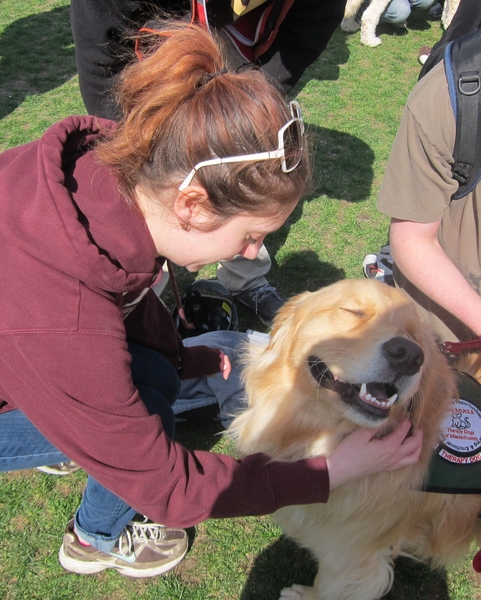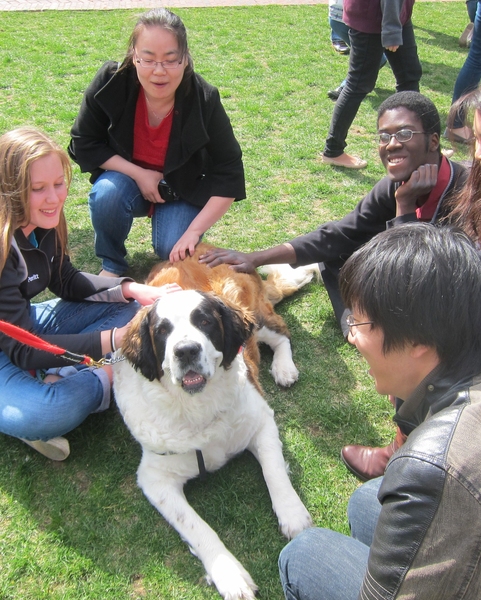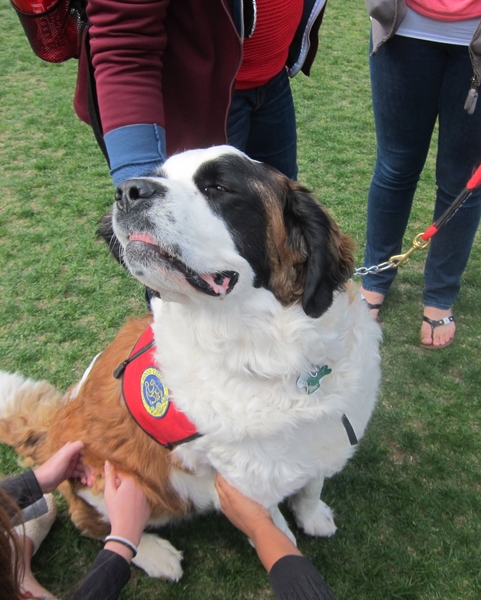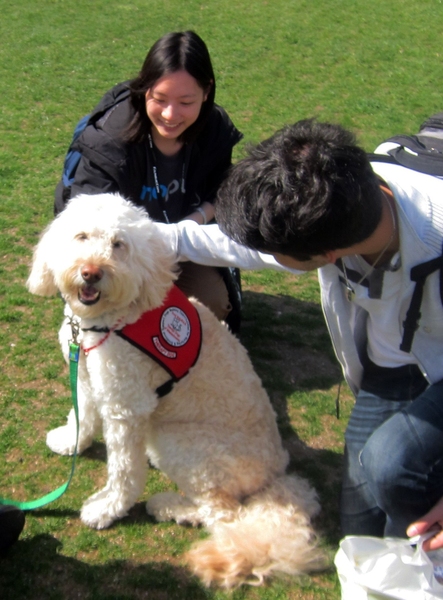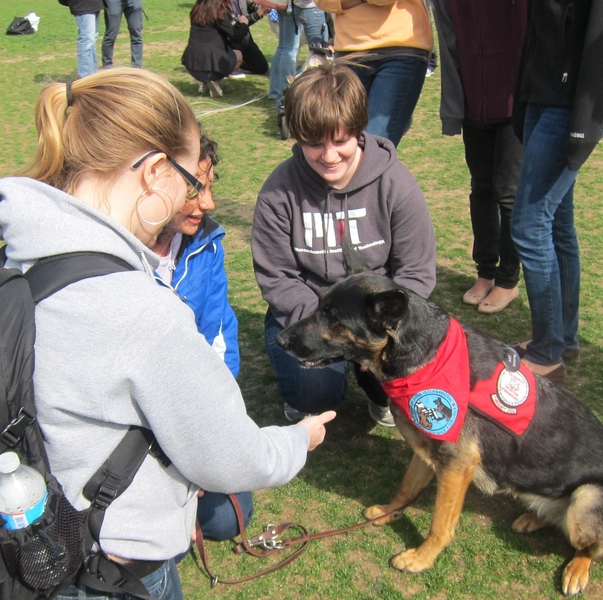After a tumultuous week, MIT welcomed some furry, tail-wagging comfort. A group of therapy dogs and volunteers from Dog B.O.N.E.S. (Building Opportunities for Nurturing and Emotional Support) of Scituate, Mass., came to campus on Monday, April 22, to boost students’ spirits in the wake of the Boston Marathon bombings and the death of MIT Police Officer Sean Collier.
The dogs have visited previously to relive stress during finals week, but this time MIT put out a call asking for therapy dogs to lend emotional support. Dozens of handlers and their dogs responded, and for three hours the Kresge Lawn was crowded with fuzzy, four-legged therapists that ranged in size from Murphy, a tiny pug, to Savannah and Sidney, sister Saint Bernards. The MIT Parents Association was also on hand offering cookies, milk, ice cream and even hugs to students who needed one.
According to Ed Pratt, the handler for Savannah and Sidney, dogs can sense distress in people and respond sympathetically. For students who were shocked by three days of violence so close to home, the sympathy was welcome. “The dogs were a great distraction from everything that’s happened,” said Dacie Manion, a mechanical engineering sophomore. “We need help to move on, and these dogs gave us a way to start doing that today.”
Since its founding in 2002, Dog B.O.N.E.S. has trained more than 800 therapy dogs and owners. The organization's mission is to provide affectionate and obedient therapy dogs and handlers for visits to group homes, nursing homes, hospitals and rehabilitation clinics. Some even work as reading dogs, helping elementary school children who are struggling with reading to gain confidence by practicing out loud with a dog. “They show her all the pictures,” said Bruce Hamon, whose yellow lab Hannah also works as a reading dog. “It’s great for children who are slower readers and who feel bullied by others, because the dogs won’t laugh when they make a mistake.”
Unlike service animals who are trained to help persons with visual or hearing impairments, Dog B.O.N.E.S. dogs are pets, and their owners handle them while on duty. The dogs have to pass the Canine Good Citizen and Therapy Dog certifications, and are trained to stay calm in crowds and strange environments. “They have to be comfortable in any situation, and with any equipment they might come in contact with, especially in hospitals and nursing homes,” added Pratt.
“It was a great emotional pick-me-up,” said Brooke Johnson, a senior in physics who found comfort among the Goldens, Doodles, Shepherds and Labs. “It felt sort of like things were returning to normal.”
The dogs have visited previously to relive stress during finals week, but this time MIT put out a call asking for therapy dogs to lend emotional support. Dozens of handlers and their dogs responded, and for three hours the Kresge Lawn was crowded with fuzzy, four-legged therapists that ranged in size from Murphy, a tiny pug, to Savannah and Sidney, sister Saint Bernards. The MIT Parents Association was also on hand offering cookies, milk, ice cream and even hugs to students who needed one.
According to Ed Pratt, the handler for Savannah and Sidney, dogs can sense distress in people and respond sympathetically. For students who were shocked by three days of violence so close to home, the sympathy was welcome. “The dogs were a great distraction from everything that’s happened,” said Dacie Manion, a mechanical engineering sophomore. “We need help to move on, and these dogs gave us a way to start doing that today.”
Since its founding in 2002, Dog B.O.N.E.S. has trained more than 800 therapy dogs and owners. The organization's mission is to provide affectionate and obedient therapy dogs and handlers for visits to group homes, nursing homes, hospitals and rehabilitation clinics. Some even work as reading dogs, helping elementary school children who are struggling with reading to gain confidence by practicing out loud with a dog. “They show her all the pictures,” said Bruce Hamon, whose yellow lab Hannah also works as a reading dog. “It’s great for children who are slower readers and who feel bullied by others, because the dogs won’t laugh when they make a mistake.”
Unlike service animals who are trained to help persons with visual or hearing impairments, Dog B.O.N.E.S. dogs are pets, and their owners handle them while on duty. The dogs have to pass the Canine Good Citizen and Therapy Dog certifications, and are trained to stay calm in crowds and strange environments. “They have to be comfortable in any situation, and with any equipment they might come in contact with, especially in hospitals and nursing homes,” added Pratt.
“It was a great emotional pick-me-up,” said Brooke Johnson, a senior in physics who found comfort among the Goldens, Doodles, Shepherds and Labs. “It felt sort of like things were returning to normal.”
